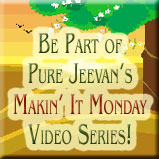
To help keep all of you inspired, we ve asked some
remarkable individuals to share their raw food stories with you. Enjoy!
Here's an impromptu interview with Matt Miller, the gourmet raw foods chef from Maggie's Mercantile, a vegan/raw restaurant in Pittsburgh, PA. We met Matt @ a recent Raw Foods Meetup here in Pittsburgh. In the video, we discuss Matt's famously addictive raw blue corn chips -- deemed by yours truly as the "holy grail" of raw foods. Below, I'll go over the ingredients, etc.
Read more: Jim from Pure Jeevan Interviews Raw Chef Matt Miller

Wow, are you in for a treat! I came up with the most delicious soup recipe today! I wanted to make something that didn't require use of the food processor, blender, or dehydrator because I've gotten quite a few emails saying that it's too hard to be raw if you don't have the money for the appliances.
I disagree that it's too hard to be raw without the appliances. It's definitely easier to do it *with* the appliances, but it's not overly hard to do it without. So, from time-to-time I'll try to create recipes that don't use anything more than a knife and a chopping board to show you that it's not too difficult to eat raw. :-)

All this month, Jim has been experimenting with a low-fat, raw vegan diet. He discusses his reasons for trying a low fat diet, and how he s been feeling with the changes, in his first and second posts so far this month.
Many of you have heard us mention the famous low-fat, raw vegan 80/10/10 diet here on our blog. Well, today I d like to highlight the individual behind that diet. So?

A month has gone by since my last health update. At this point, I consider myself healed of lyme disease! In the past I asked the lyme specialist doctor if there's a way to test to see for certain the lyme is gone, but he said there isn't. So, I go on my inner wisdom, which tells me that it's gone and now I simply need to continue healing from all that the lyme brought with it.
We're still not comfortable sharing what we've been learning and doing to help move my body into an even healthier state, but it's obviously working. I've been able to go back to daily living, for the most part, without much assistance at all. I've organized the house again (Jim and KDcaT were busy caring for me and the house wasn't the top priority for the past half a year), caught up on all of the laundry, responded to all of my email that had been piling up, and I've been able to be more social again. The biggest improvements are that I can now prepare my own food without experiencing any pain, and I can dress myself with only minimal assistance at times! BIG improvements!

 Yesterday was a ton of fun, wasn't it? Sam loves all of the comments, so if you haven't viewed her video, please do -- and let her know how much you enjoyed it!? For today, we just wanted to announce the addition of a permanent new button along the right sidebar of our blog. As you can see, it links to this post from a few weeks back when we first announced a call for guest raw chefs. There, you'll find the details on hosting a segment of Makin' It Monday, just like Sam did.
Yesterday was a ton of fun, wasn't it? Sam loves all of the comments, so if you haven't viewed her video, please do -- and let her know how much you enjoyed it!? For today, we just wanted to announce the addition of a permanent new button along the right sidebar of our blog. As you can see, it links to this post from a few weeks back when we first announced a call for guest raw chefs. There, you'll find the details on hosting a segment of Makin' It Monday, just like Sam did.
By the way, just last week, we passed a noteworthy milestone that we didn't mention -- our 500th blog post here at Pure Jeevan. That's a lot of raw foods coverage, right ! Well, we're really still getting started when it comes to the level of information and inspiration we're planning for Pure Jeevan -- so it's great to add new features like this now, as we're able to. Of course, once our home sells and we're finally able to move on to the next phase of our lives, we envision Pure Jeevan exploding with more content than ever before. What fun it'll be to be able to devote ourselves full-time to spreading the word about raw foods!
Original Comments
Below, we have included the original comments from this blog post. Additional comments may be made via Facebook, below.
Read more: Be Part of Pure Jeevan's Makin' It Monday Video Series!
This pie is amazing and exactly like a traditionally cooked pumpkin pie! I took a few different pie recipes and altered them until I came up with this recipe.
Pumpkin Pie
Filling:

Wow, with literally years of raw food coverage under our belts here at Pure Jeevan, we don't think we've ever devoted an entire post to fermented foods. Well it's high time we do, don't you think ? Check out the video and then we'll discuss it further...

What better way to start our Fun-Filled Friday than by celebrating Jim's birthday ! He worked for half the day and now he's home for a long weekend. So far we've had a nice lunch (cashew/macadamia cheese with red peppers and celery) and birthday pie (mango and pineapple!) after singing "Happy Birthday" to him! This evening we'll have veggie stir-not-fry, since that's what Jim has requested. I prepared it earlier and it's in the dehydrator to marinade and get a bit warm.

We're still busy researching cities in order to find our future home town!? Our original list of potentials is now more of less narrowed down to a few select areas. That's not to say that we're not still open to further suggestions. (See here for our desires in a new home town.)? At the moment, of the cities/regions remaining on our "active" list, the Ashland, Oregon area is looking fairly attractive. So, we thought we'd take a moment to ask a few questions about Ashland. But first, here's why...
Originally, we felt highly drawn to Corvallis, Oregon. It seemed like the absolute perfect place for us -- a phenomenal homeschooling / unschooling community (which is what first caught our attention), a progressive / artsy atmosphere, affordable land, and super-clean air. Great, right ! ?But then we looked at the amount of sunshine the city received ... hmmm, no improvement whatsoever over Pittsburgh (in fact, Corvallis is, unfortunately, equally as gloomy -- at 44% of the days having sun).
Read more: Moving Update: Some Finalist Towns -- Ashland, Orgeon

We're here to inspire you...that's our overall focus here at Pure Jeevan. So, when we ask you what you'd like us to do more of, less of, or to consider doing here on the blog ... we take your responses to heart. Of course, it's impossible to please every single person since we all have different personalities and needs. However, we'll always do our best to create a balance in order to inspire as many individuals as possible.
Below are suggestions for what some of you'd like to see happening here on the blog, along with some responses from us. If you have more suggestions, please send them our way anytime. We read everything that comes in and will always give your suggestions serious consideration.

